Ginkgo Biloba Benefits: 15 Powerful Health Boosters
Know about the herbal supplement that helps treat anxiety and improves heart health.

Image: i Stock
Gingko biloba is also known as a living fossil and is a popular herbal supplement native to China. It has been used in Chinese traditional medicine for its therapeutic values. The health benefits of gingko biloba can be attributed to its antioxidant and anti-inflammatory properties. The intake of this medicinal herb can help reduce the symptoms of psychiatric disorders, treat anxiety, fight inflammation, support eye health, and improve cardiovascular health.

In this article, we have discussed the health benefits of gingko biloba, its recommended dosage, and potential side effects. Continue reading.
 Know Your Ingredient: Ginkgo Biloba
Know Your Ingredient: Ginkgo BilobaWhat Is It?
A species of tree native to China that is widely used as a herbal supplement.
What Are Its Benefits?
Improves eye and heart health, enhances brain function, helps manage PMS, and may treat sexual dysfunction.
Who Can Use It?
All except people with epilepsy and diabetes, and pregnant women.
How Often?
Up to 120-240 mg daily or as prescribed by a physician.
Caution
Avoid using it if you use blood thinning medication or antidepressants. May cause allergies, stomach issues, dizziness, headaches, and nausea.
In This Article
What Are The Benefits Of Ginkgo Biloba?
1. May Reduce Symptoms Of Psychiatric Disorders
Ginkgo may help reduce symptoms of psychiatric disorders like Alzheimer’s and dementia (1). A study conducted by the Beijing University of Chinese Medicine found that ginkgo extract may increase functional capabilities in those with Alzheimer’s when used in conjunction with conventional medicine (2).
Another study found ginkgo extract to be effective in the treatment of symptoms associated with dementia (3). Some anecdotal evidence suggests that ginkgo may also improve blood flow to the brain (4). Another study conducted by the Free University Berlin found that ginkgo extract may improve the condition of individuals with dementia (5). Epilepsy is a common cause of serious cognitive disorders. One rat study stated that ginkgo extract could improve cognitive function, learning, and memory (6).
Ginkgo biloba contains two key components, terpene lactones and flavone glycosides. They help improve brain function and support memory by reducing harmful molecules (free radicals) in the brain. Gingko biloba may also protect areas like the hippocampus, important for memory, from age-related changes. Its antioxidant properties may help clear out harmful molecules, aiding the management of conditions like Alzheimer’s and stroke. This protection may also help reduce symptoms of psychiatric disorders by improving brain health and function (7).
2. May Help Treat Anxiety

Ginkgo biloba extract may reduce the symptoms of anxiety and promote stress relief. The extract was used in Chinese traditional herbal medicine to treat neurodegenerative disordersi Incurable disorders wherein the brain or peripheral nervous system's nerve cells fail to properly function. (8). Animal studies state that the antioxidant content of the ginkgo biloba extract may help reduce anxiety symptoms and other cognitive impairments (9), (10).
In one study, a group of 107 people treated with a high dose of ginkgo reported a reduction in anxiety symptoms (11). However, more research is needed to further understand this benefit of ginkgo biloba.
3. May Fight Inflammation
Ginkgo has the ability to reduce inflammation caused by various conditions. A study conducted by the National Taiwan University found that ginkgo biloba extract can reduce markers of inflammation in animal and human cells (12), (13), (14). There are other inflammatory conditions ginkgo extract may help treat. These include:
- Arthritis: A study conducted on rats found that ginkgo extract could help ease arthritis (15).
- Stroke: Ginkgo biloba extract has been suggested to patients with acute ischemic stroke (sudden loss of blood circulation to an area of the brain). The herb is said to possess neuroprotective properties that help improve cognitive function in patients (16).
- Irritable bowel disease (IBD): A study conducted by Cairo University found that curcumin and ginkgo could be effective in the prevention and treatment of IBD (17).
More number of human studies are needed to understand the role of ginkgo extract in treating various ailments.
4. May Support Eye Health

Some early research states that supplementing with ginkgo may increase blood flow to the eyes. It could be a potential treatment for glaucoma. However, conclusive evidence is lacking in this regard (18). A small study conducted by the London School of Hygiene and Tropical Medicine found that ginkgo extract may have a beneficial effect on vision. Further trials are warranted (19).
Ginkgo biloba extract also has the potential to treat normal-tension glaucoma (20). More research is needed to determine if ginkgo is truly effective in promoting vision health.
5. May Improve Heart Health
Ginkgo may increase blood flow by promoting the dilation of blood vessels. It has been used in the treatment of issues related to poor blood circulation. Ginkgo has the ability to increase blood flow to various parts of the body.
Ginkgo biloba extract (GBE) is a promising therapeutic agent for cardiovascular and ischaemic diseases. It promotes vascular (of blood vessels) health (21). A study conducted by the Second Hospital of Hebei Medical University found that ginkgo extract improves coronary artery circulation in patients with coronary artery disease (22). It also showed the same effect in the elderly (23). This extract has protective effects on heart health. It also may help in the treatment of neurological and cardio-cerebrovascular disorders (24), (25), (26).
Ginkgo extract may be beneficial in the treatment of diabetic myocardial injury (issues related to the heart membranes) (27).
6. May Improve Brain Function
Ginkgo has been repeatedly evaluated for its ability to reduce anxiety, stress, and other symptoms associated with Alzheimer’s disease and age-related cognitive decline. A study conducted by the Department of Health Sciences, Liberty University, found that supplementing with ginkgo extract may increase mental performance (28).
Another study conducted by the University of Munich found that the herb improves mental functioning in healthy volunteers (29). Anecdotal evidence suggests ginkgo may play a major role in improving blood flow to the brain.
7. May Aid Depression Treatment
Ginkgo extract has anti-inflammatory properties that may help in the treatment of depression. A study found that supplementing with ginkgo extract may help treat symptoms of depression (30). However, more research is warranted in this regard.
8. May Treat Headaches and Migraines
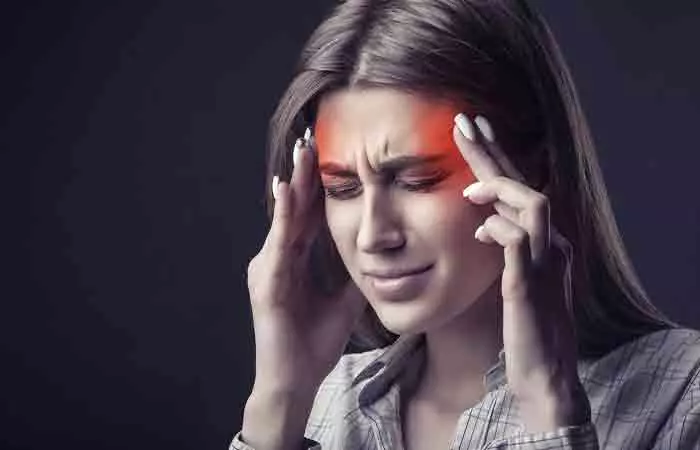
Ginkgo biloba can reduce inflammation and potentially increase blood flow to the brain. It may treat certain types of headaches and migraines. Herbs that fight inflammation are quite popular in traditional Chinese medicine as a treatment for migraines and headaches (31). However, little research is available to support this claim.
A study discusses ginkgolide B, which is an herbal constituent extracted from ginkgo biloba tree leaves. The constituent was found to help prevent migraines and headaches at a young age (32). Another study found that ginkgolide B may be used to reduce the severity and frequency of migraines with aura (migraines with vision changes) (33).
 Trivia
Trivia9. May Improve Asthma And COPD Symptoms
The anti-inflammatory properties of ginkgo biloba extract may treat symptoms associated with respiratory diseases such as asthma and chronic obstructive pulmonary disease (COPD). A study conducted by Jilin University found that the anti-inflammatory compounds available in ginkgo may reduce inflammation in the airways (34). In another study, asthma patients treated with ginkgo extract showed better improvement in their condition compared to patients who received conventional medication alone (35).
In another study, a group of 100 COPD patients over 50 years of age who consumed a mixture of Chinese herbs (including ginkgo) reported a reduction in bronchitis and cough (36).
10. May Reduce PMS Symptoms

Ginkgo biloba may help reduce PMS symptoms. A study found a reduction of PMS symptoms by 23% after consuming ginkgo extract (37). Further information on the safety of the herb in this regard is needed.
Ginkgolide B has also been associated with a reduction in PMS symptoms (38).
11. May Treat Sexual Dysfunction
Ginkgo biloba extract (GBE) may facilitate blood flow and influence nitric oxide systems, and has a relaxant effect on smooth muscle tissue. These processes are important for sexual response in women. GBE may have the potential to boost sexual health in women (39).
A study found that ginkgo extract has the ability to improve blood levels of nitric oxide (40). This may help improve women’s sexual function too. However, we need more research to further understand this mechanism of ginkgo.
12. May Help Reduce Obesity

Ginkgo biloba extract (GBE) may help reduce obesity. One rat study stated that ginkgo biloba extract could be efficient in preventing and treating obesity-induced insulin signaling impairment (41). GBE may improve insulin resistance and reduce body weight gain (42). GBE may also represent a potential alternative therapy for menopause-related obesity (43).
A study found that ginkgo biloba leaves could improve blood lipid parameters. They could be used in the treatment of dyslipidemia (abnormal amount of lipids in the blood) (43). Ginkgo biloba extract reduces oxidative stress in diet-induced obese rats (45). It could also exhibit anti-obesogenic effectsi The effect of substances that help reduce body fat by preventing fat absorption, boosting energy expenditure, or mobilizing fat. in white adipose tissue of rats (46).
More long-term studies are needed to understand the anti-obesogenic effectsi The effect of substances that help reduce body fat by preventing fat absorption, boosting energy expenditure, or mobilizing fat. of ginkgo extract on humans.
13. May Improve Skin Health
Ginkgo biloba is said to possess anti-aging effects too. The ginkgo leaf extract contains quercetin and kaempferol (natural plant flavonoids that act as antioxidants) that help fight free radicals. They may reduce signs of skin aging. Ginkgo also had synergistic effectsi A term used to convey that the effects of exposure to two or more chemicals together is greater than those to any one of them. with green tea on improving skin barrier function and elasticity (47).
14. May Boost Hair Growth
Ginkgo biloba has been proven to potentially help slow down hair loss. It may also promote hair growth. However, these studies have been conducted on mice alone (48).
 Trivia
TriviaThese are the benefits of ginkgo biloba. In the following section we will look at the herb’s ideal dosage.
15. May Help Treat Tinnitus
Ginkgo biloba may aid in addressing the troubling condition of tinnitus, commonly referred to as ear ringing. A study published in the Journal of Audiology & Otology found that ginkgo biloba may improve blood flow to the cochlea, which may help manage tinnitus. Further, the participants in the study reported marked improvement in their tinnitus handicap scores as compared to the placebo group. This study suggests that ginkgo biloba, in conjunction with antioxidants, may potentially improve the quality of life for individuals with tinnitus (49). However, studies are limited in this regard and more scientific evidence is required to support these claims.
Key Takeaways
- Ginkgo biloba has multiple medicinal characteristics. For example, it is good for fighting inflammation and protecting cells.
- The herb helps promote blood circulation and fight oxidative stress, reducing signs of skin aging.
- The herb is also beneficial for scalp health and hair growth.
- Consuming the herb regularly has shown benefits like enhanced memory and reduced symptoms of depression.
Dosage And Forms Of Ginkgo Biloba
Ginkgo biloba is available in various forms such as liquid extracts, tablets, capsules, and dried leaves/tea. It seems to be most effective when taken in several doses throughout the day (total daily dosage being 120–240 mg). Ensure you do not take the raw form of ginkgo, as it can be poisonous.
Ginkgo may take up to 4 to 6 weeks to show any results. A common dose of 40 milligrams of extract three times daily is recommended to those with dementia. For improving cognitive function in healthy people, 120 milligrams to 600 milligrams of the extract may be used. These values are based on anecdotal evidence. Consult your doctor for more information.
Though ginkgo biloba is generally safe for use, it does have a few side effects that you need to keep in mind. Check them out in the next section.
What Are The Side Effects Of Ginkgo Biloba?
Excess intake of ginkgo biloba may cause several adverse effects. These may include allergies, headaches, stomach pain, diarrhea, dizziness, nausea, and some drug interactions.
In some cases, intake of the herb can cause serious harm. Individuals who are allergic to plants with alkylphenolsi Organic compounds used in the production of detergents, adhesives, cosmetics, emulsifiers, and cleaning products. , pregnant and breastfeeding women, and people with epilepsy should avoid intake. People who are on medications must consult with their doctor before taking ginkgo.
High exposure to ginkgo may increase the risk of breast and colorectal cancers in some individuals. Also, ginkgo does not seem to reduce the risk of other forms of cancer (50). Some anecdotal evidence suggests that ginkgo has the potential to interact with certain medications like blood thinners (aspirin, warfarin) and antidepressants.
 Trivia
TriviaThere are various ways in which ginkgo biloba side effects may manifest if taken in excess. The herb may also have other risks associated with it.
Risks
Ginkgo is generally considered safe for healthy people when used in limited amounts for up to six months. The Food and Drug Administration (FDA) doesn’t regulate ginkgo supplements or most other drugs that contain the herb (51).
Some anecdotal evidence suggests that ginkgo may lower blood sugar levels. Hence, use it with caution if you have diabetes.
Eating raw or roasted ginkgo seeds may be poisonous and may lead to adverse effects. Research is limited here, though.
Infographic: 8 Ways Ginkgo Biloba Can Promote Your Health
Ginkgo biloba is commonly used in traditional Chinese medicine to reduce inflammation and promote heart health. It also has antioxidant properties that help reduce anxiety and improve cognitive function. Take a look at the infographic below to learn more about how this herb can improve your overall health and well-being. Illustration: StyleCraze Design Team
Gingko biloba is a popular herbal supplement known for its anti-inflammatory and antioxidant properties. Along with its important benefits for heart, digestive, bone, and brain health, Gingko biloba is also known to help deal with anxiety, dementia, and depression. It also improves concentration and mental well-being. Health experts believe that it may also help boost the immune system and promote longevity. Available as liquid extracts, tablets, capsules, or tea, it is important to follow the required dosage and prescription to make the most of Gingko biloba benefits. You should consult a licensed health practitioner before including it in your diet or healthcare routine.
Frequently Asked Questions
Should I take ginkgo at night?
Ginkgo can stimulate your brain and keep you awake the whole night. Do not take it before sleep.
Does Ginkgo biloba cause liver damage?
Ginkgo has not been linked to liver damage. In fact, it is sometimes used to treat certain liver ailments (52).
Does Ginkgo biloba raise blood pressure?
There is no research stating that ginkgo may raise blood pressure. Though ginkgo has vasodilatory properties, it is unclear if it can reduce blood pressure.
Does ginkgo biloba work immediately?
Possibly not. Anecdotal evidence suggests that ginkgo biloba can take up to six weeks to start showing any effects.
Can I take ginkgo biloba with vitamin D?
There is limited information on the safety of taking ginkgo biloba with vitamin D. Consult your doctor for more information.
Can ginkgo biloba help treat tinnitus and vertigo?
Yes, ginkgo biloba is linked to the treatment of tinnitus, a condition accompanied by ringing noises in one or both ears (53). It is also linked with the treatment of equilibrium disorders like vertigo (54).
Illustration: Ginkgo Biloba Benefits, Dosage, And Side Effects
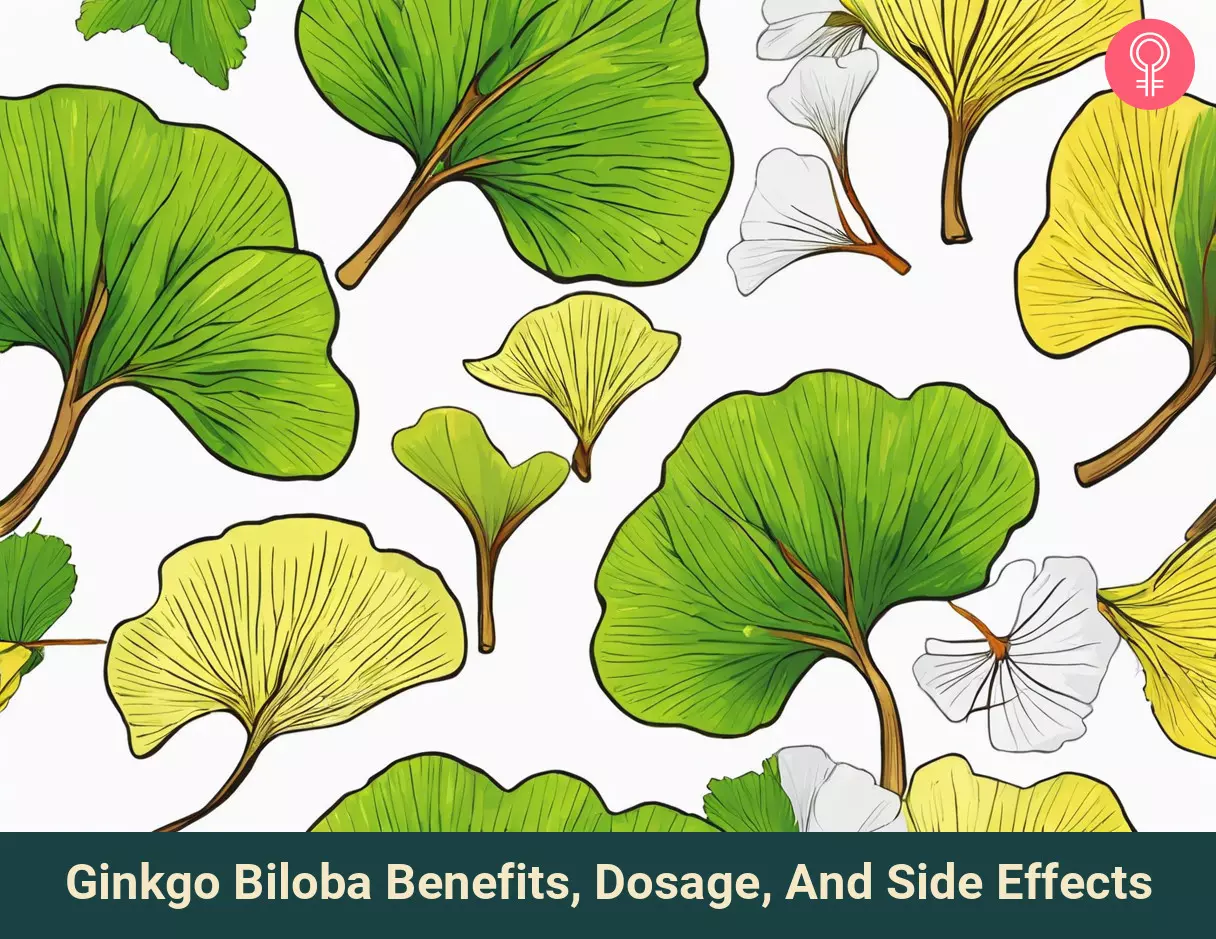
Image: Stable Diffusion/StyleCraze Design Team
References
Articles on StyleCraze are backed by verified information from peer-reviewed and academic research papers, reputed organizations, research institutions, and medical associations to ensure accuracy and relevance. Read our editorial policy to learn more.
- Yuan, Qiuju, et al. “Effects of Ginkgo Biloba on Dementia: An Overview of Systematic Reviews.” Journal of Ethnopharmacology, Elsevier, 7 Dec. 2016.
https://www.sciencedirect.com/science/article/abs/pii/S0378874116322590 - Yang G, Wang Y, Sun J, Zhang K, Liu J. Ginkgo Biloba for Mild Cognitive Impairment and Alzheimer’s Disease: A Systematic Review and Meta-Analysis of Randomized Controlled Trials. Curr Top Med Chem. 2016;16(5):520‐528.
https://pubmed.ncbi.nlm.nih.gov/26268332/ - Savaskan E, Mueller H, Hoerr R, von Gunten A, Gauthier S. Treatment effects of Ginkgo biloba extract EGb 761® on the spectrum of behavioral and psychological symptoms of dementia: meta-analysis of randomized controlled trials. Int Psychogeriatr. 2018;30(3):285‐293.
https://pubmed.ncbi.nlm.nih.gov/28931444/ - Le Bars PL, Katz MM, Berman N, Itil TM, Freedman AM, Schatzberg AF. A placebo-controlled, double-blind, randomized trial of an extract of Ginkgo biloba for dementia. North American EGb Study Group. JAMA. 1997;278(16):1327‐1332.
https://pubmed.ncbi.nlm.nih.gov/9343463/ - Kanowski S, Herrmann WM, Stephan K, Wierich W, Hörr R. Proof of efficacy of the ginkgo biloba special extract EGb 761 in outpatients suffering from mild to moderate primary degenerative dementia of the Alzheimer type or multi-infarct dementia. Pharmacopsychiatry. 1996;29(2):47‐56.
https://pubmed.ncbi.nlm.nih.gov/8741021/ - Chen Y, Feng Z, Shen M, et al. Insight into Ginkgo biloba L. Extract on the Improved Spatial Learning and Memory by Chemogenomics Knowledgebase, Molecular Docking, Molecular Dynamics Simulation, and Bioassay Validations. ACS Omega. 2025;5(5):2428‐2439. Published 2025 Jan 28.
https://pubmed.ncbi.nlm.nih.gov/32064403/ - Nguyen T, Alzahrani T. Ginkgo Biloba. [Updated 2025 Feb 27]. In: StatPearls [Internet]. Treasure Island (FL): StatPearls Publishing; 2025 Jan.
https://www.ncbi.nlm.nih.gov/books/NBK541024/ - Ekici-Günay, Nahide. “Ginkgo Biloba Extract as an Antioxidant in Nerve Regeneration.” Pathology, Academic Press, 1 May 2025,
https://www.sciencedirect.com/science/article/abs/pii/B9780128159729000238 - Savage K, Firth J, Stough C, Sarris J. GABA-modulating phytomedicines for anxiety: A systematic review of preclinical and clinical evidence. Phytother Res. 2018;32(1):3‐18.
https://pubmed.ncbi.nlm.nih.gov/29168225/ - Montes P, Ruiz-Sanchez E, Rojas C, Rojas P. Ginkgo biloba Extract 761: A Review of Basic Studies and Potential Clinical Use in Psychiatric Disorders. CNS Neurol Disord Drug Targets. 2015;14(1):132‐149.
https://pubmed.ncbi.nlm.nih.gov/25642989/ - Woelk H, Arnoldt KH, Kieser M, Hoerr R. Ginkgo biloba special extract EGb 761 in generalized anxiety disorder and adjustment disorder with anxious mood: a randomized, double-blind, placebo-controlled trial. J Psychiatr Res. 2007;41(6):472‐480.
https://pubmed.ncbi.nlm.nih.gov/16808927/ - Chen YJ, Tsai KS, Chiu CY, et al. EGb761 inhibits inflammatory responses in human chondrocytes and shows chondroprotection in osteoarthritic rat knee. J Orthop Res. 2013;31(7):1032‐1038.
https://pubmed.ncbi.nlm.nih.gov/23483610/ - Kotakadi, Venkata S et al. “Ginkgo biloba extract EGb 761 has anti-inflammatory properties and ameliorates colitis in mice by driving effector T cell apoptosis.” Carcinogenesis vol. 29,9 (2008): 1799-806.
https://www.ncbi.nlm.nih.gov/pmc/articles/PMC2527648/ - Zuo, Wei et al. “Advances in the Studies of Ginkgo Biloba Leaves Extract on Aging-Related Diseases.” Aging and disease vol. 8,6 812-826. 1 Dec. 2017.
https://www.ncbi.nlm.nih.gov/pmc/articles/PMC5758353/ - LIU, Ji-xin, and Yan-feng YANG. “Therapeutic effects of ginkgo biloba extracts on adjuvant arthritis in rats and the mechanism [J].” Chinese Journal of New Drugs 8 (2012).
https://www.researchgate.net/publication/291678498_Therapeutic_effects_of_ginkgo_biloba_extracts_on_adjuvant_arthritis_in_rats_and_the_mechanism - Chong PZ, Ng HY, Tai JT, Lee SWH. Efficacy and Safety of Ginkgo biloba in Patients with Acute Ischemic Stroke: A Systematic Review and Meta-Analysis. Am J Chin Med. 2025;48(3):513‐534.
https://pubmed.ncbi.nlm.nih.gov/32349519/ - Motawi TK, Rizk SM, Shehata AH. Effects of curcumin and Ginkgo biloba on matrix metalloproteinases gene expression and other biomarkers of inflammatory bowel disease. J Physiol Biochem. 2012;68(4):529‐539.
https://pubmed.ncbi.nlm.nih.gov/22535283/ - Kang JM, Lin S. Ginkgo biloba and its potential role in glaucoma. Curr Opin Ophthalmol. 2018;29(2):116‐120.
https://pubmed.ncbi.nlm.nih.gov/29206653/ - Evans JR. Ginkgo biloba extract for age-related macular degeneration. Cochrane Database Syst Rev. 2013;2013(1):CD001775. Published 2013 Jan 31.
https://pubmed.ncbi.nlm.nih.gov/23440785/ - Labkovich M, Jacobs EB, Bhargava S, Pasquale LR, Ritch R. Ginkgo Biloba Extract in Ophthalmic and Systemic Disease, With a Focus on Normal-Tension Glaucoma [published online ahead of print, 2025 Apr 10]. Asia Pac J Ophthalmol (Phila). 2025;10.1097/APO.0000000000000279.
https://pubmed.ncbi.nlm.nih.gov/32282348/ - Tian J, Liu Y, Chen K. Ginkgo biloba Extract in Vascular Protection: Molecular Mechanisms and Clinical Applications. Curr Vasc Pharmacol. 2017;15(6):532‐548.
https://pubmed.ncbi.nlm.nih.gov/28707602/ - Wu Y, Li S, Cui W, Zu X, Du J, Wang F. Ginkgo biloba extract improves coronary blood flow in healthy elderly adults: role of endothelium-dependent vasodilation. Phytomedicine. 2008;15(3):164‐169.
https://pubmed.ncbi.nlm.nih.gov/18258419/ - Yang Y, Li Y, Wang J, et al. Systematic Investigation of Ginkgo Biloba Leaves for Treating Cardio-cerebrovascular Diseases in an Animal Model. ACS Chem Biol. 2017;12(5):1363‐1372.
https://pubmed.ncbi.nlm.nih.gov/28333443/ - Nabavi SM, Habtemariam S, Daglia M, et al. Neuroprotective Effects of Ginkgolide B Against Ischemic Stroke: A Review of Current Literature. Curr Top Med Chem. 2015;15(21):2222‐2232.
https://pubmed.ncbi.nlm.nih.gov/26059355/ - Nash, Kevin M, and Zahoor A Shah. “Current Perspectives on the Beneficial Role of Ginkgo biloba in Neurological and Cerebrovascular Disorders.” Integrative medicine insights vol. 10 1-9. 9 Nov. 2015.
https://www.ncbi.nlm.nih.gov/pmc/articles/PMC4640423/ - Tian, Jinfan et al. “Ginkgo biloba Leaf Extract Protects against Myocardial Injury via Attenuation of Endoplasmic Reticulum Stress in Streptozotocin-Induced Diabetic ApoE-/- Mice.” Oxidative medicine and cellular longevity vol. 2018 2370617. 25 Feb. 2018.
https://www.ncbi.nlm.nih.gov/pmc/articles/PMC5845491/ - Mix JA, Crews WD Jr. A double-blind, placebo-controlled, randomized trial of Ginkgo biloba extract EGb 761 in a sample of cognitively intact older adults: neuropsychological findings. Hum Psychopharmacol. 2002;17(6):267‐277.
https://pubmed.ncbi.nlm.nih.gov/12404671/ - Cieza A, Maier P, Pöppel E. Effects of Ginkgo biloba on mental functioning in healthy volunteers. Arch Med Res. 2003;34(5):373‐381.
https://pubmed.ncbi.nlm.nih.gov/14602503/ - Montes P, Ruiz-Sanchez E, Rojas C, Rojas P. Ginkgo biloba Extract 761: A Review of Basic Studies and Potential Clinical Use in Psychiatric Disorders. CNS Neurol Disord Drug Targets. 2015;14(1):132‐149.
https://pubmed.ncbi.nlm.nih.gov/25642989/ - Chang YY, Tsai YT, Lai JN, Yeh CH, Lin SK. The traditional Chinese medicine prescription patterns for migraine patients in Taiwan: a population-based study. J Ethnopharmacol. 2014;151(3):1209‐1217.
https://pubmed.ncbi.nlm.nih.gov/24389028/ - Usai, Susanna et al. “Gingkolide B as migraine preventive treatment in young age: results at 1-year follow-up.” Neurological sciences : official journal of the Italian Neurological Society and of the Italian Society of Clinical Neurophysiology vol. 32 Suppl 1,Suppl 1 (2011): S197-9.
https://www.ncbi.nlm.nih.gov/pmc/articles/PMC3084934/ - D’Andrea G, Bussone G, Allais G, et al. Efficacy of Ginkgolide B in the prophylaxis of migraine with aura. Neurol Sci. 2009;30 Suppl 1:S121‐S124.
https://pubmed.ncbi.nlm.nih.gov/19415441/ - Chu X, Ci X, He J, et al. A novel anti-inflammatory role for ginkgolide B in asthma via inhibition of the ERK/MAPK signaling pathway. Molecules. 2011;16(9):7634‐7648. Published 2011 Sep 6.
https://pubmed.ncbi.nlm.nih.gov/21900866/ - Tang Y, Xu Y, Xiong S, et al. The effect of Ginkgo Biloba extract on the expression of PKCalpha in the inflammatory cells and the level of IL-5 in induced sputum of asthmatic patients. J Huazhong Univ Sci Technolog Med Sci. 2007;27(4):375‐380.
https://pubmed.ncbi.nlm.nih.gov/17828490/ - Cai, Yong et al. “Effects of Lung Support Formula on respiratory symptoms among older adults: results of a three-month follow-up study in Shanghai, China.” Nutrition journal vol. 12 57. 6 May. 2013,
https://www.ncbi.nlm.nih.gov/pmc/articles/PMC3698174/ - Ozgoli G, Selselei EA, Mojab F, Majd HA. A randomized, placebo-controlled trial of Ginkgo biloba L. in treatment of premenstrual syndrome. J Altern Complement Med. 2009;15(8):845‐851.
https://pubmed.ncbi.nlm.nih.gov/19678774/ - Allais G, Castagnoli Gabellari I, Burzio C, et al. Premenstrual syndrome and migraine. Neurol Sci. 2012;33 Suppl 1:S111‐S115.
https://pubmed.ncbi.nlm.nih.gov/22644184/ - Meston, Cindy M et al. “Short- and long-term effects of Ginkgo biloba extract on sexual dysfunction in women.” Archives of sexual behavior vol. 37,4 (2008): 530-47.
https://www.ncbi.nlm.nih.gov/pmc/articles/PMC2863090/ - Wu YZ, Li SQ, Zu XG, Du J, Wang FF. Ginkgo biloba extract improves coronary artery circulation in patients with coronary artery disease: contribution of plasma nitric oxide and endothelin-1. Phytother Res. 2008;22(6):734‐739.
https://pubmed.ncbi.nlm.nih.gov/18446847/ - Banin RM, Hirata BK, Andrade IS, et al. Beneficial effects of Ginkgo biloba extract on insulin signaling cascade, dyslipidemia, and body adiposity of diet-induced obese rats. Braz J Med Biol Res. 2014;47(9):780‐788.
https://pubmed.ncbi.nlm.nih.gov/25075573/ - Hirata, Bruna Kelly Sousa et al. “Ginkgo biloba extract improves insulin signaling and attenuates inflammation in retroperitoneal adipose tissue depot of obese rats.” Mediators of inflammation vol. 2015 (2015): 419106.
https://www.ncbi.nlm.nih.gov/pmc/articles/PMC4415619/ - Banin, Renata M et al. “Ginkgo biloba Extract (GbE) Stimulates the Hypothalamic Serotonergic System and Attenuates Obesity in Ovariectomized Rats.” Frontiers in pharmacology vol. 8 605. 5 Sep. 2017.
https://www.ncbi.nlm.nih.gov/pmc/articles/PMC5591947/ - Fan Y, Jin X, Man C, Gong D. Does Adjuvant Treatment With Ginkgo Biloba to Statins Have Additional Benefits in Patients With Dyslipidemia?. Front Pharmacol. 2018;9:659. Published 2018 Jun 22.
https://pubmed.ncbi.nlm.nih.gov/29988404/ - Hirata, Bruna K S et al. “Ginkgo biloba Extract Modulates the Retroperitoneal Fat Depot Proteome and Reduces Oxidative Stress in Diet-Induced Obese Rats.” Frontiers in pharmacology vol. 10 686. 14 Jun. 2019.
https://www.ncbi.nlm.nih.gov/pmc/articles/PMC6587378/ - Hirata BKS, Cruz MM, de Sá RDCC, et al. Potential Anti-obesogenic Effects of Ginkgo biloba Observed in Epididymal White Adipose Tissue of Obese Rats. Front Endocrinol (Lausanne). 2019;10:284. Published 2019 May 10.
https://pubmed.ncbi.nlm.nih.gov/31133986/ - Campos PM, Gianeti MD, Mercurio DG, Gaspar LR. Synergistic effects of green tea and ginkgo biloba extracts on the improvement of skin barrier function and elasticity. J Drugs Dermatol. 2014;13(9):1092‐1097.
https://pubmed.ncbi.nlm.nih.gov/25226010/ - Kobayashi N, Suzuki R, Koide C, Suzuki T, Matsuda H, Kubo M. Yakugaku Zasshi. 1993;113(10):718‐724.
https://pubmed.ncbi.nlm.nih.gov/8254481/ - Chauhan, Bhushan et al. “Ginkgo biloba Administered Singly and Combined With Antioxidants in Tinnitus Patients.” Journal of audiology & otology vol. 27,1 (2025): 37-44. doi:10.7874/jao.2025.00395
https://www.ncbi.nlm.nih.gov/pmc/articles/PMC9884989/ - Mei, Nan et al. “Review of Ginkgo biloba-induced toxicity, from experimental studies to human case reports.” Journal of environmental science and health. Part C, Environmental carcinogenesis & ecotoxicology reviews vol. 35,1 (2017): 1-28.
https://www.ncbi.nlm.nih.gov/pmc/articles/PMC6373469/ - Nguyen T, Alzahrani T. Ginkgo Biloba. [Updated 2025 Feb 27]. In: StatPearls [Internet]. Treasure Island (FL): StatPearls Publishing; 2025 Jan.
https://www.ncbi.nlm.nih.gov/books/NBK541024/ - Clinical and Research Information on Drug-Induced Liver Injury [Internet]. Bethesda (MD): National Institute of Diabetes and Digestive and Kidney Diseases; 2012-. Ginkgo. [Updated 2018 Mar 14]
https://ncbi.nlm.nih.gov/books/NBK548847/ - Ginkgo biloba extract in the treatment of tinnitus: a systematic review, US National Library of Medicine.
https://www.ncbi.nlm.nih.gov/pmc/articles/PMC3157487/ - Ginkgo biloba (EGb 761) in the treatment of equilibrium disorders: US National Library of Medicine.
https://pubmed.ncbi.nlm.nih.gov/10345150/
Read full bio of Julie Freeman
Read full bio of Sindhu Koganti
Read full bio of Ravi Teja Tadimalla
Read full bio of Himanshi Mahajan






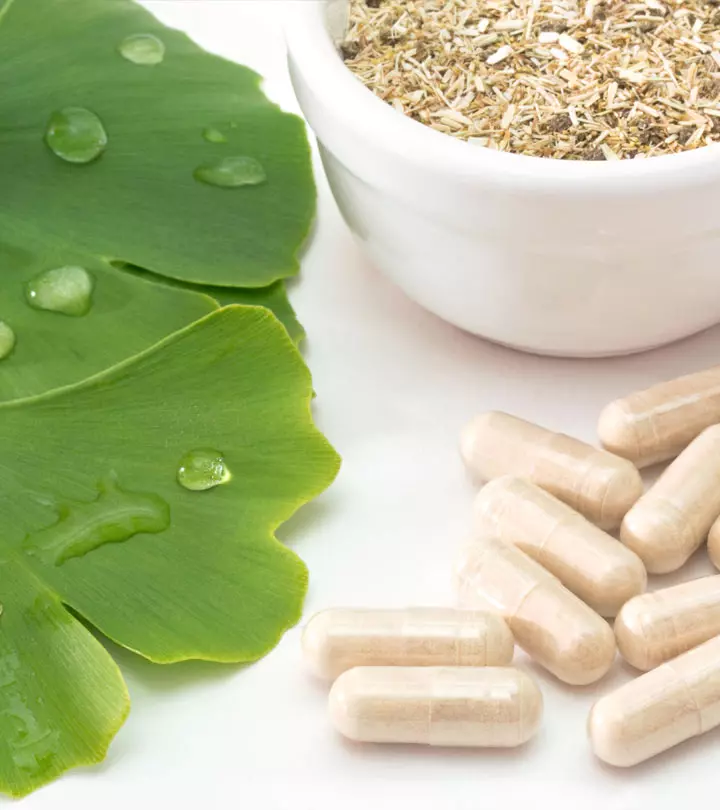
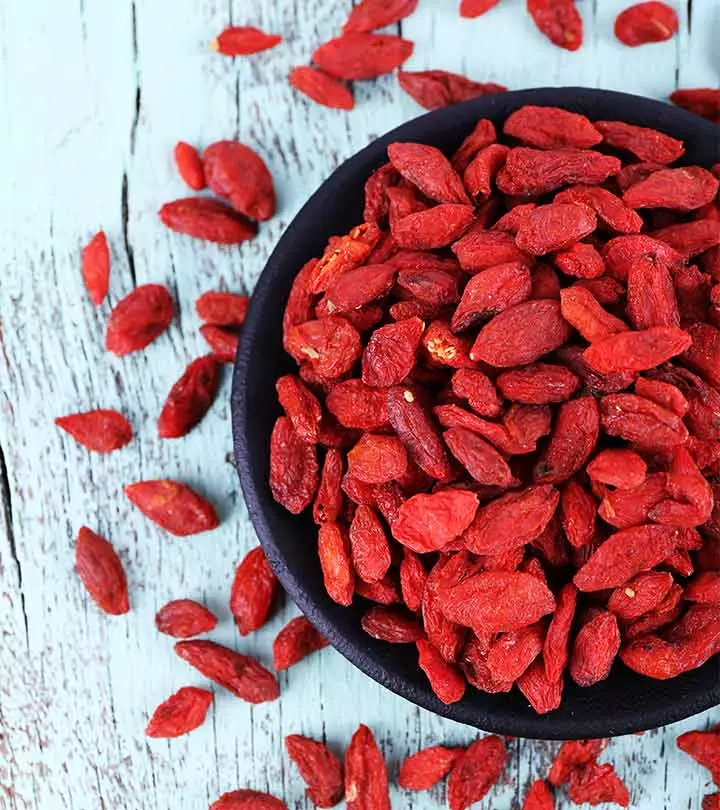


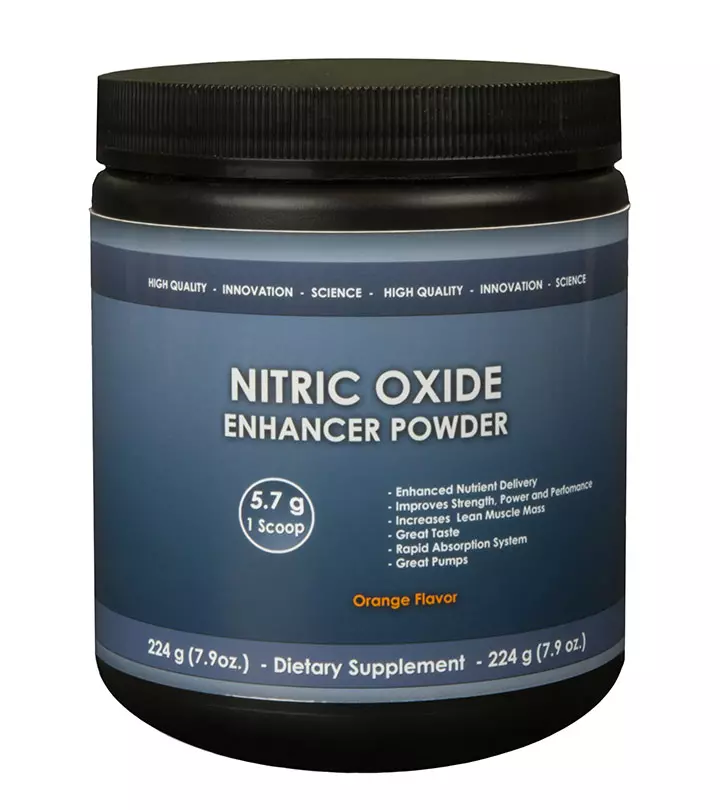

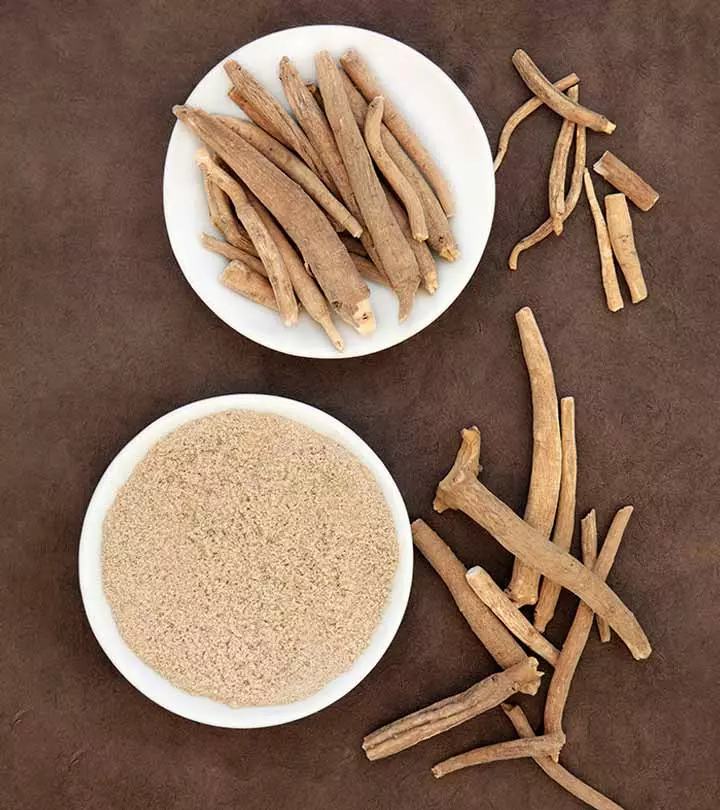
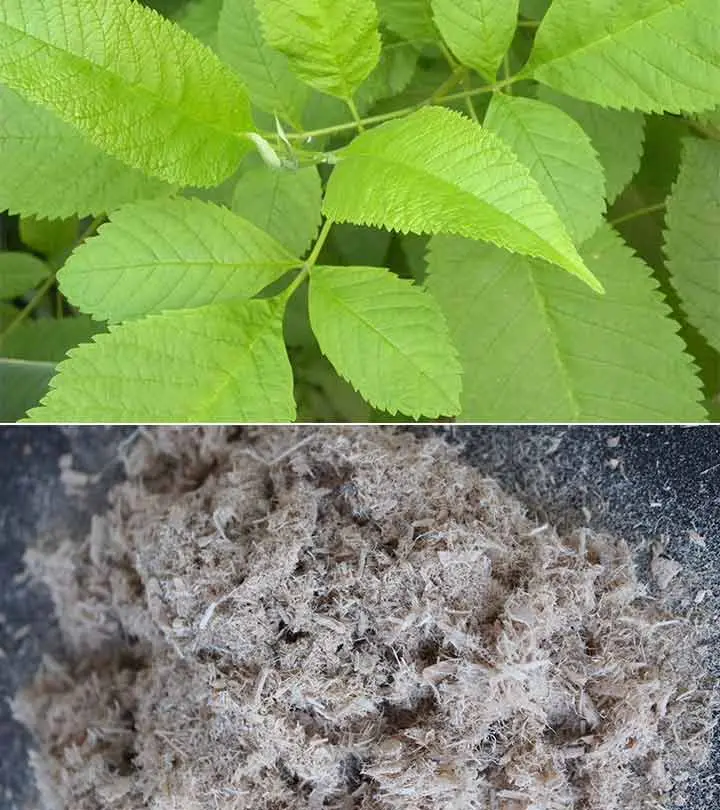
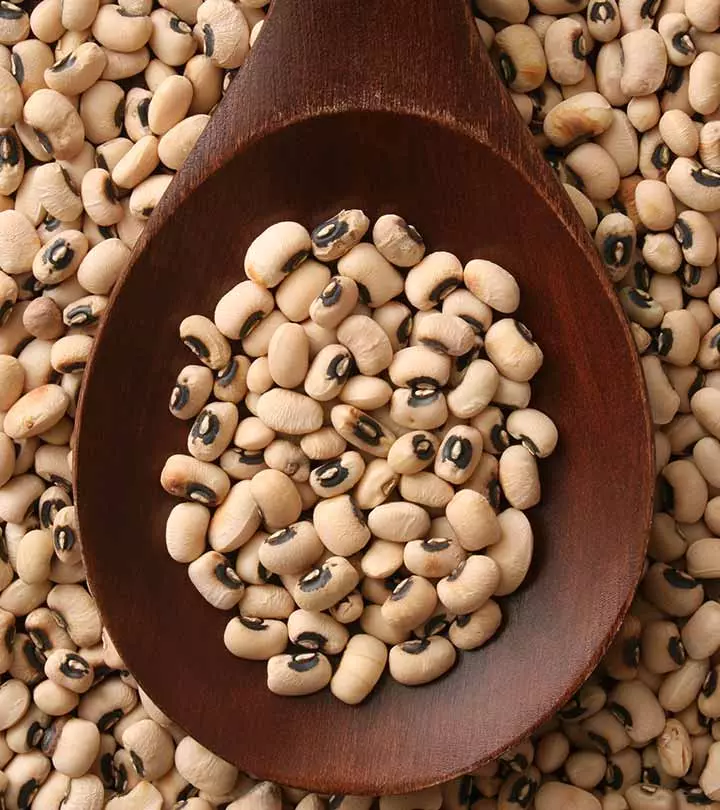


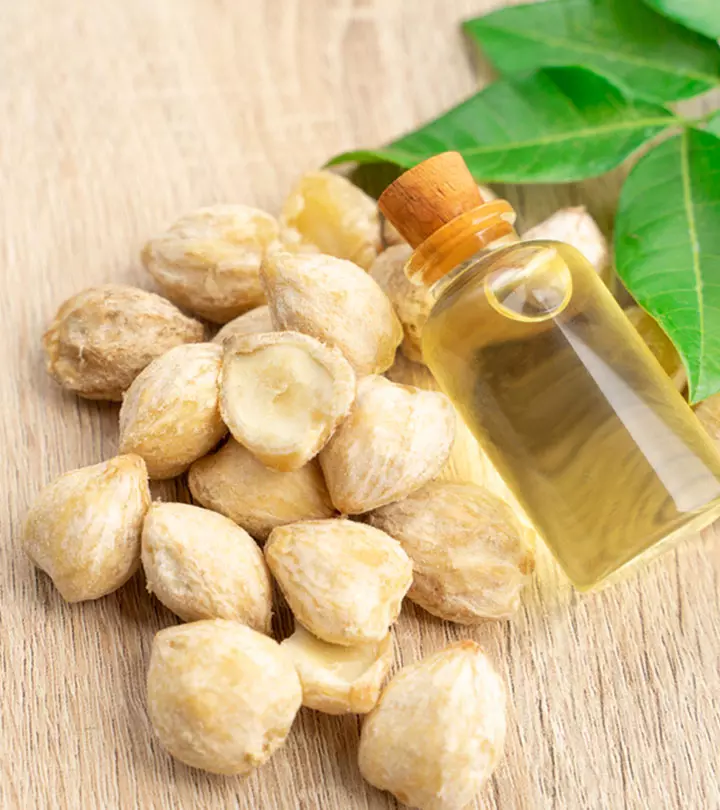
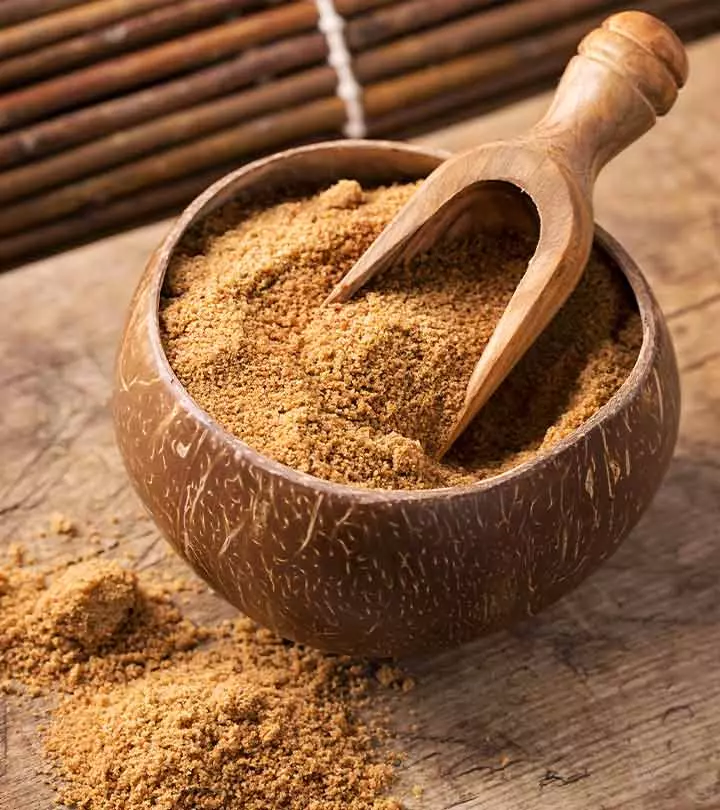
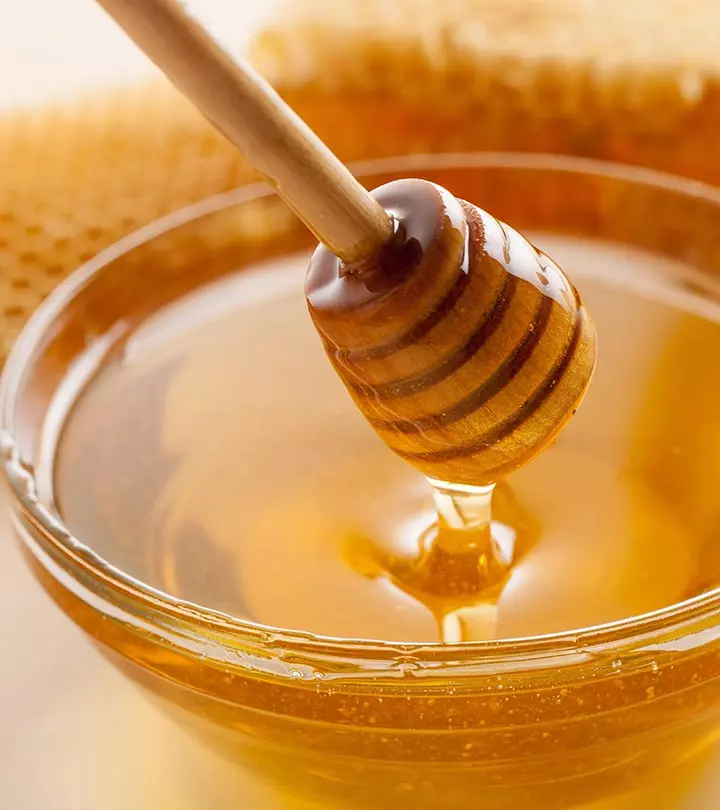
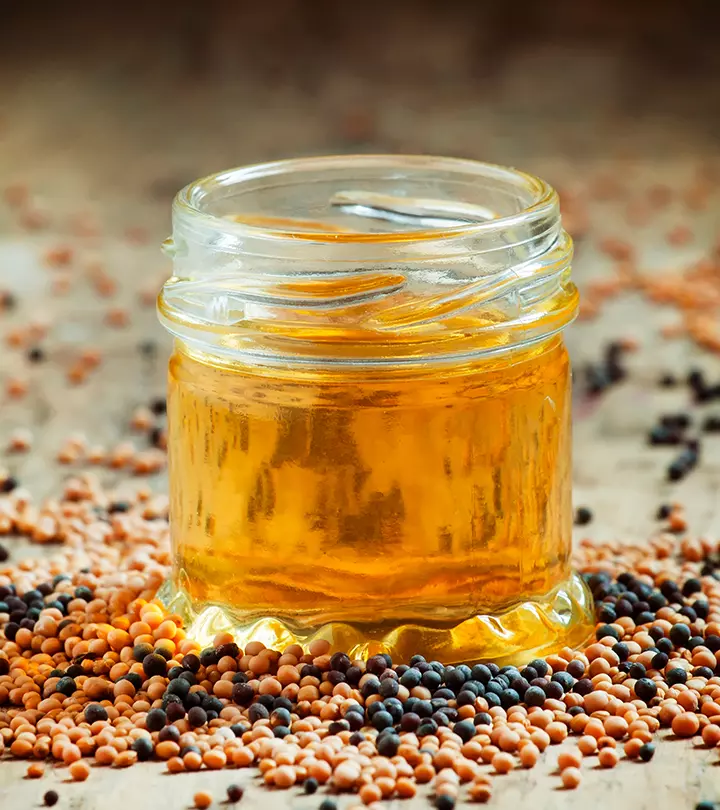
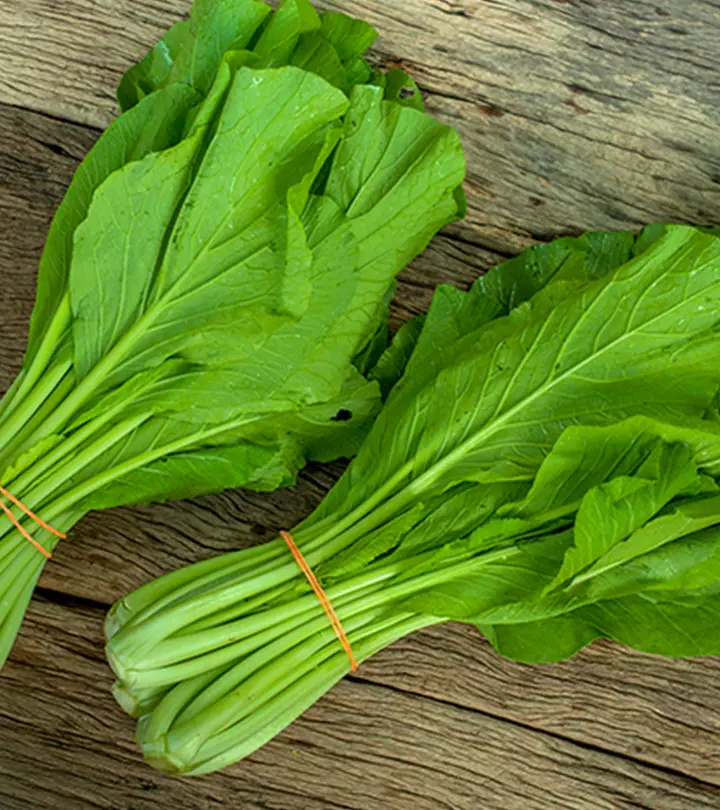


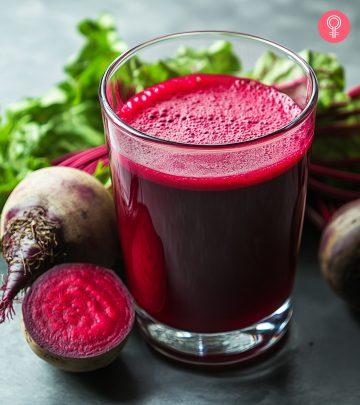
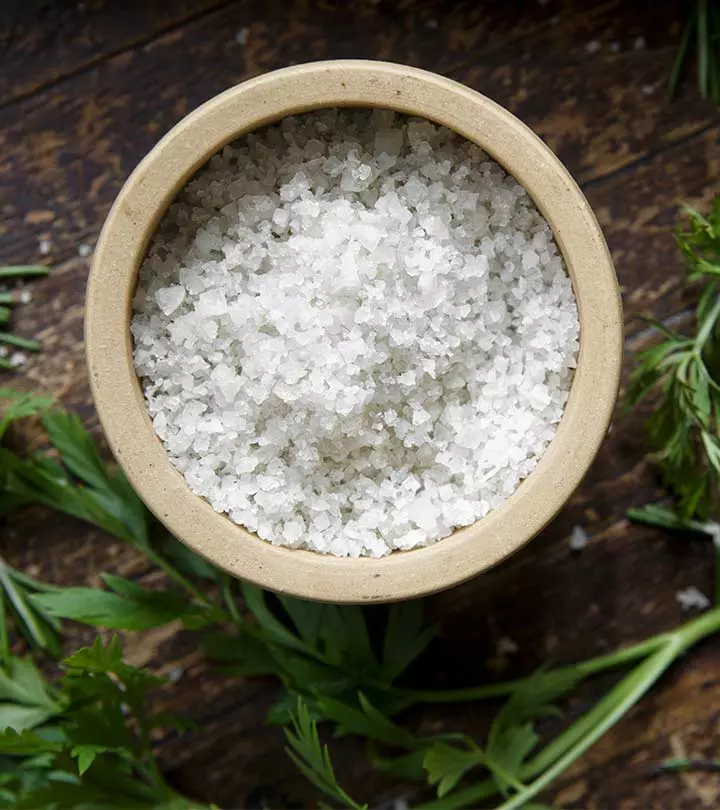

Community Experiences
Join the conversation and become a part of our empowering community! Share your stories, experiences, and insights to connect with other beauty, lifestyle, and health enthusiasts.